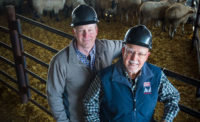How Mountain States Rosen raised awareness about domestic lamb products
In this video interview, COO of Mountain States Rosen Ernie Davis discussed the Shepherds Pride Program as well as how reaching out to bloggers and local chefs raised awareness about how to prepare lamb products.
Andy Hanacek: From your prospective, you've been in the meat industry overall for a while. Consumer awareness, consumption of lamb, and how has Mountain States Rosen been able to, kind of, push that out in the consumer landscape? Bring some added consumption to the marketplace.
Ernie Davis: Yeah, I think the American Lamb Board has done a lot to really help with awareness around American lamb, you know, domestic lamb. It continues to be a challenge. Consumption is down and our goal is to, you know, let's increase consumption. So how do we do that? We've done a great job with reaching out to bloggers and, you know, certain local chefs that have started looking at recipes, trying to help those consumers, those millennials, who want to cook at home, and give them ideas on easy ways to prepare our product. And really let them know that this is a great protein, a lot of nutritional benefits with it, so that we can get these consumers and make it easy for them.
You know, because the couple months that I've been here, when I tell people "Hey, I'm doing lamb and veal now." And they're like, "Oh, wow, lamb. I don't know how to cook that." So it's educating those consumers, giving them tools to be able to look up recipes and, you know? First thing we did when I got some product, when I took it home, is went to the website, looked up a recipe, followed the recipe, and had a great meal. Kids loved it. My wife loved it. It was really nice. So we did the same thing with our friends and neighbors. We did the same thing with them. Looked up a recipe, cooked it up, and you know, "Oh wow, I keep forgetting how great lamb is!" So it's just reminding those consumers again.
Additional ContentCEO Dennis Stiffler discusses the company's role in the lamb processing industry and the future advancements in technology and food service strategies. Watch the video. Be sure to also read our March 2016 cover story on Mountain States Rosen. |
Hanacek: So is there anything that, strategically speaking in this realm, that's ultra innovative or particularly unique to lamb? Because I know some of the other proteins out there are doing similar things with bloggers and things like that.
Davis: Right, and that's part of it. I think the other big piece of it is our Shepherds Pride Program, which is no antibiotics ever. And we also are source verified. And that means that we can tell you what one of our ranchers that product came from. And I think that's where those consumers are saying, "Hey, you know, that farm to plate movement that's happening out there. We can do that for them. We can give them that information." And because we are owned by the farmers, the ranchers, the co-op, that owns us, the members. You know, that's even a bigger story and a better story for us to be able to tell to consumers, and connect them with those families. Because we have fourth and fifth generation ranchers out there. We want those sixth and seventh generation ranchers as well.
Hanacek: So what opportunities are out there on the horizon for lamb specifically, and how is Mountain States Rosen positioning itself? You got into it a little bit with the Shepard's Pride thing, but talk about the other opportunities that are out there, for lamb specifically, that you guys need to capitalize on.
Davis: Well, all the statistics that we've looked at with fresh look data, we know that lamb is a growing category, it's one of the few meat categories that has shown some growth, and they're projecting continued growth with it, so I think that's a big piece of it. So, it's getting distribution on it, again, getting out there and getting that story out to these consumers. Understanding the Shepherd's Pride program is a big opportunity for us because it gets us into that Never Ever category. We're no antibiotics, and that category continues to expand and grow in other proteins. Now we give the consumer that, once those natural products, an additional option. So, it's a matter of getting distribution with it and getting it on the shelves to give the consumers an opportunity to pick it up. So, I think that's a big piece of it on the retail side.
I think there's also a big opportunity for us on the food service side because if you think about those consumers, a lot of them, I think, try lamb when they go out to eat because they don't have to worry about knowing how to cook it, or they don't have to worry about figuring out a recipe, they can depend on that restaurant, that they're going to provide them a great meal. So I think that's where we have an opportunity, as well, to be able to brand that. Again, we've got a Never Ever program. These are highlighting some of those ranchers that are owners and connecting them with the consumer.
Hanacek: What about millennials? Talk about how they fit into this picture, because a lot of what you're saying about consumers not knowing how to cook lamb. The protein industry as a whole, and even just the food industry as a whole, is dealing with millennials who don't necessarily know how to cook. I wouldn't say anything, but a lot of things.
Davis: I disagree with that a little bit. I think the millennials want to be able to do that. Now, they haven't learned it from their parents, and I think we've kind of lost that, from the grandmother would teach the granddaughter to cook, or the mother would teach the daughter to cook. I think we've kind of lost that in the generation, again, because our lives are so busy and all these changes, but I think it's coming back the other way now, that they want to learn how to cook and everything else. But if you look at all the food shows that are out there, you look at the bloggers, like we talked about earlier with those bloggers, and these chefs are now celebrities because of the following that they get, and the recipes and all that you see on the Food Network, and all the different competitions and the shows, and they're talking about, showing them recipes, showing them how to put that stuff together and how easy it is. So I think that lends itself to not just lamb, but in protein in general.
Hanacek: And so, as they see it being done, they're going to be more comfortable with it.
Davis: Yeah, absolutely. I think it gives them a little bit more, you know, "Hey, I watched..." It gives them something to talk about. "Hey, I saw this Chef So-and-so on on the FoodNet, he made this recipe. I pulled it off the website and I made this recipe. What do you guys think?" "Oh, this is great." They're, you know, at a dinner party with friends. So, I think that you're seeing that happen more and more. And there's recipes now that are happening out there, that they're easy for them and it makes it easy for them to be able to prepare that meal for their families.
Looking for a reprint of this article?
From high-res PDFs to custom plaques, order your copy today!




